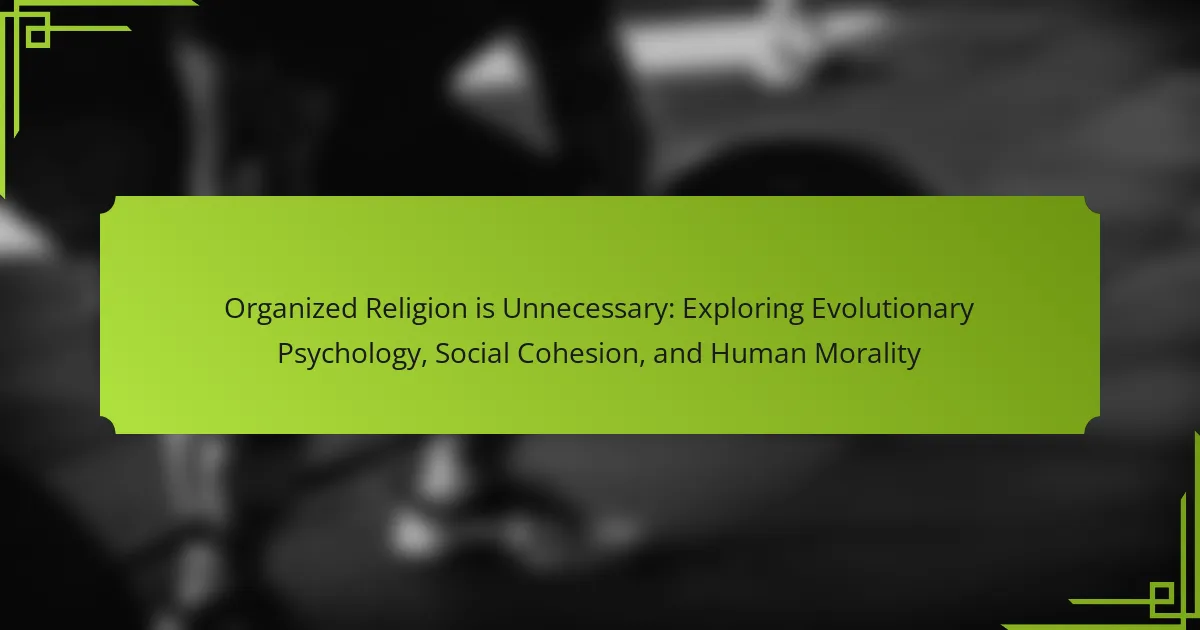Organized religion may not be necessary for fostering morality and social cohesion in contemporary society. Evolutionary psychology reveals that moral behaviour can develop independently of religious frameworks. Secular communities demonstrate strong social bonds through shared values and mutual support. This article explores how evolution shapes our moral instincts, the role of social cohesion outside religious institutions, and the implications for personal identity and ethical guidelines.
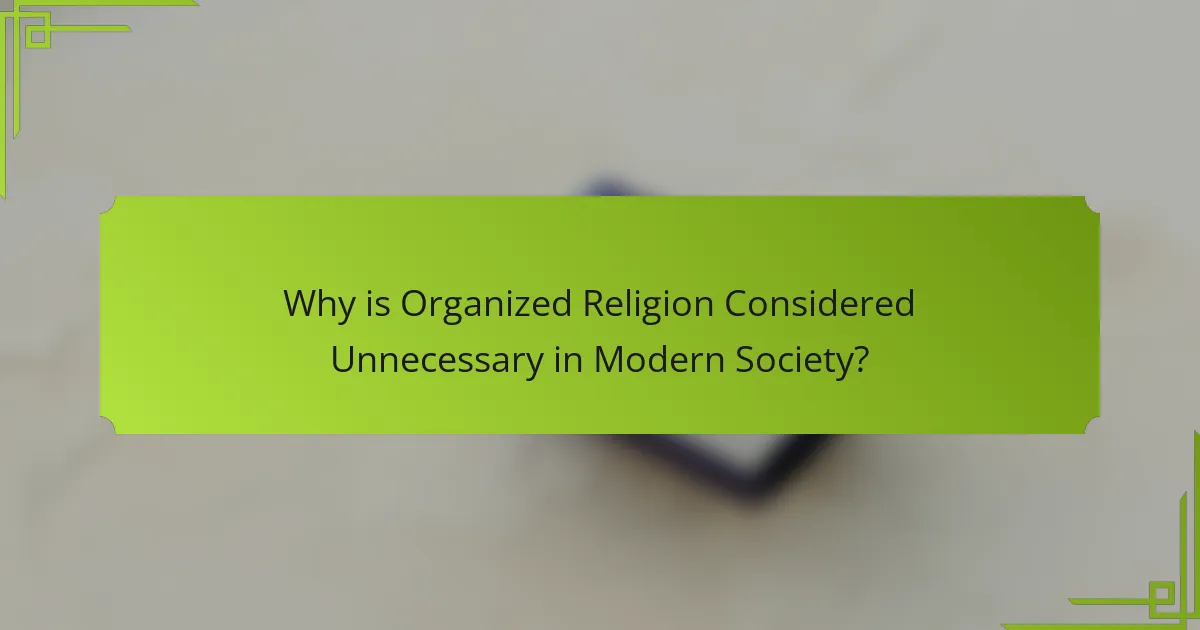
Why is Organized Religion Considered Unnecessary in Modern Society?
Organized religion is often viewed as unnecessary in modern society due to evolving perspectives on morality and social cohesion. Evolutionary psychology suggests that human morality can exist independently of religious frameworks, relying instead on innate social instincts. As societies advance, secular moral systems increasingly promote ethical behaviour without religious influence. Additionally, social cohesion can be achieved through shared values and community engagement rather than organized religious institutions. Studies indicate that secular groups can foster strong community bonds, demonstrating that fulfilment and purpose can be derived from non-religious affiliations.
How does Evolutionary Psychology explain human social behaviour?
Evolutionary psychology explains human social behaviour by emphasizing innate drives for cooperation and social bonding. These traits enhance group survival and promote moral frameworks. Social cohesion, vital for human evolution, fosters trust and reduces conflict, leading to more stable communities. This perspective challenges the necessity of organized religion, suggesting that moral behaviour can arise from evolutionary mechanisms rather than external doctrines.
What role does social cohesion play in human communities?
Social cohesion is vital for human communities as it fosters trust, cooperation, and collective identity. This interconnectedness enhances social stability and promotes moral behaviour. Research shows that communities with strong social bonds exhibit lower crime rates and higher levels of civic engagement. Social cohesion also supports mental well-being, as individuals feel a sense of belonging and support.
How do moral frameworks develop without organized religion?
Moral frameworks can develop through social interactions, evolutionary psychology, and cultural norms without organized religion. Human beings possess innate moral instincts shaped by evolutionary pressures that promote cooperation and social cohesion.
Research indicates that empathy, reciprocity, and fairness are fundamental components of morality, emerging from our ancestral environments. These attributes foster group survival, enabling individuals to thrive in social settings.
Cultural transmission plays a crucial role in moral development. Societies establish norms and values that guide behaviour, often independent of religious doctrines. For instance, secular ethics emphasize human rights and welfare, reflecting shared human experiences rather than divine commandments.
In conclusion, moral frameworks can evolve through natural human tendencies and societal influences, demonstrating that organized religion is not a prerequisite for morality.
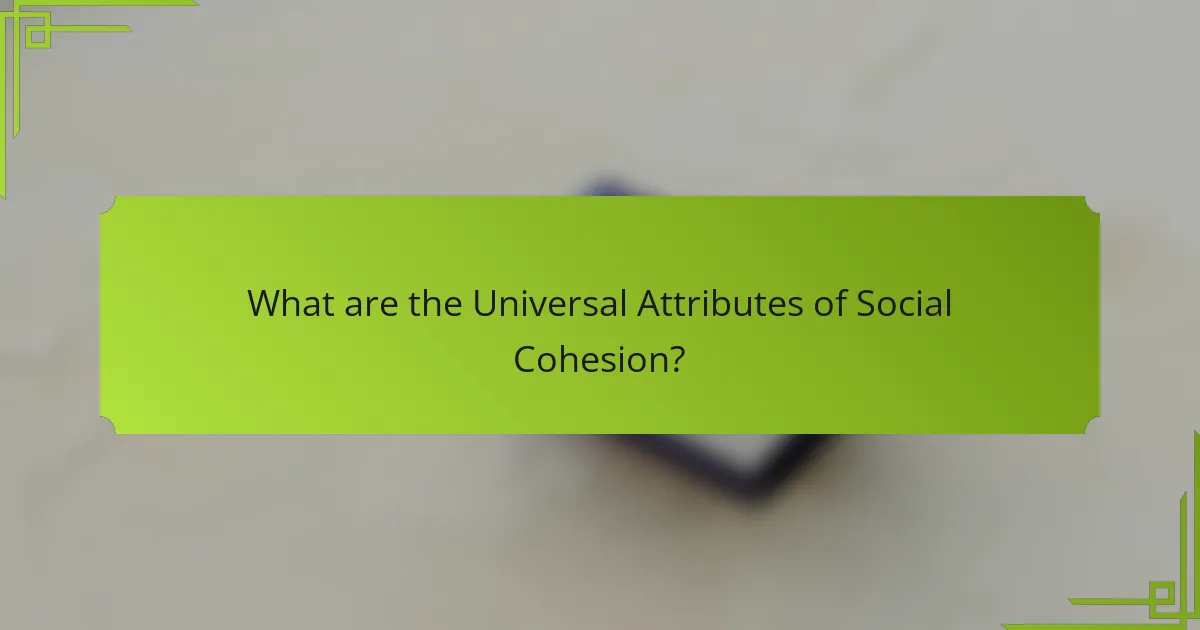
What are the Universal Attributes of Social Cohesion?
Social cohesion is characterized by shared values, trust, and mutual support among individuals. These universal attributes foster community resilience and collective identity. Shared values create common goals, while trust enhances cooperation. Mutual support leads to stronger social networks, facilitating collaboration and resource sharing.
How do shared values contribute to group stability?
Shared values enhance group stability by fostering trust, cooperation, and a sense of belonging. When members align on core beliefs, they create a cohesive environment that supports social cohesion. This alignment reduces conflict and promotes collaboration, essential for group survival. Research shows that shared values can lead to increased group resilience, enabling members to face challenges collectively. Ultimately, these values serve as a foundation for moral behaviour, reinforcing group identity and stability.
What mechanisms promote trust among individuals?
Trust among individuals is promoted through shared beliefs, social norms, and reciprocal altruism. Shared beliefs create a common foundation, fostering connections. Social norms guide behaviour, establishing expectations that enhance cooperation. Reciprocal altruism encourages individuals to act in ways that benefit others, reinforcing trust through mutual support. These mechanisms highlight the evolutionary psychology behind social cohesion and human morality.
How does cooperation emerge in human societies?
Cooperation in human societies emerges through shared goals, social norms, and mutual benefits. Evolutionary psychology suggests that cooperation enhances survival and social cohesion. Humans develop moral frameworks that promote trust and collaboration, facilitating group dynamics. Studies indicate that societies with strong social bonds tend to thrive, demonstrating the importance of cooperation in cultural evolution.
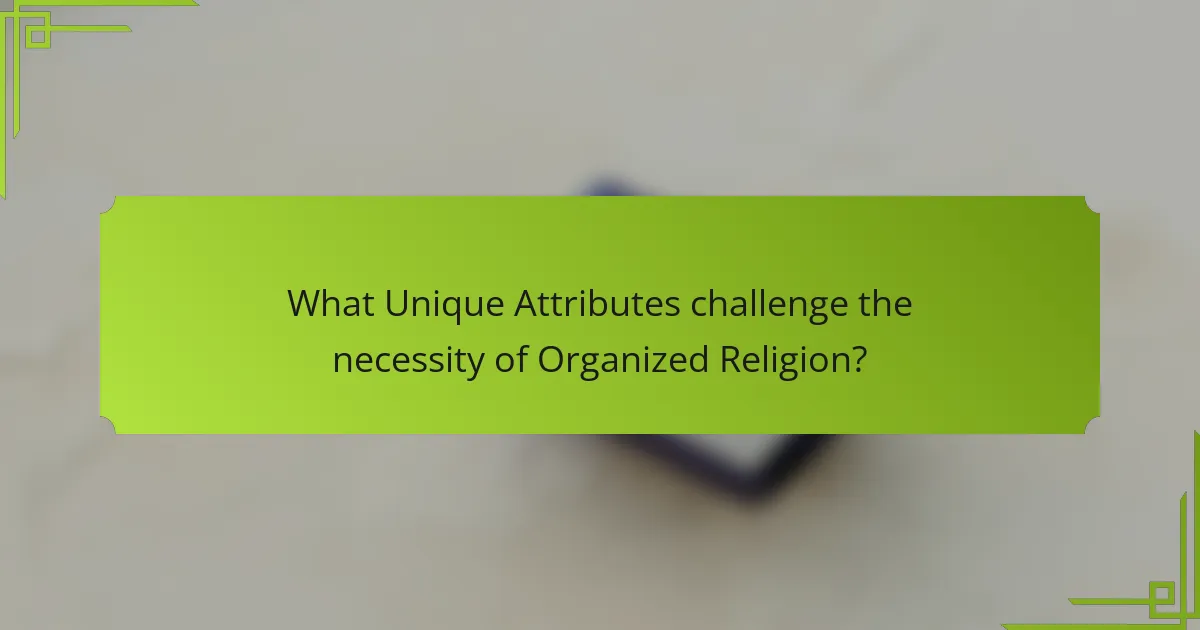
What Unique Attributes challenge the necessity of Organized Religion?
Evolutionary psychology, social cohesion, and human morality present unique attributes that challenge the necessity of organized religion. These attributes demonstrate that human beings can develop moral frameworks and social bonds independently of religious structures. For instance, studies indicate that moral behaviour can arise from evolutionary advantages, promoting cooperation and social harmony without religious influence. Additionally, social cohesion can be achieved through secular community organizations, which foster belonging and shared values. This suggests that the fundamental human need for connection and morality does not inherently require organized religion.
How do secular moral systems function effectively?
Secular moral systems function effectively by relying on shared human values and social contracts. These systems promote cooperation and empathy, fostering social cohesion without the need for organized religion. They draw on evolutionary psychology, emphasizing innate moral instincts that guide behaviour. Secular frameworks can adapt to cultural shifts, ensuring relevance and inclusivity. Empirical studies show that diverse moral systems can coexist, allowing for a rich tapestry of ethical perspectives that enhance community bonds.
What alternative systems provide community support?
Alternative systems providing community support include secular organizations, mutual aid groups, and online communities. These entities foster social cohesion and moral development without relying on organized religion. Secular organizations often focus on shared interests or goals, promoting collaboration and support among members. Mutual aid groups emphasize reciprocal assistance, enhancing community resilience. Online communities offer platforms for connection and support, transcending geographical boundaries. Each system contributes to human morality and social ties, demonstrating that organized religion is not essential for community support.
How do individual belief systems evolve independently?
Individual belief systems evolve independently through personal experiences, cultural influences, and cognitive development. These factors shape unique perspectives on morality and social cohesion. Evolutionary psychology suggests that humans naturally seek meaning and connection, leading to diverse belief systems. As individuals navigate their environments, they adapt their beliefs to align with personal values and social contexts, fostering a rich tapestry of independent thought.
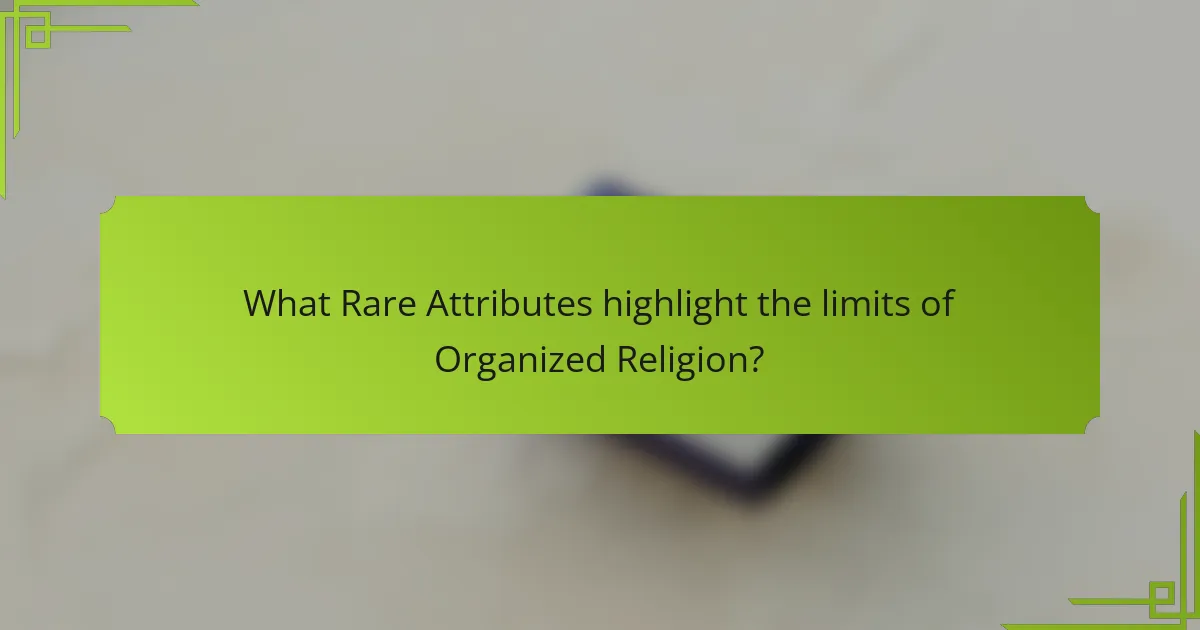
What Rare Attributes highlight the limits of Organized Religion?
Organized religion often limits individual expression and critical thinking. Rare attributes highlighting these limits include dogmatic adherence, suppression of dissent, and exclusionary practices. These factors can stifle personal growth and moral development. Additionally, the reliance on authority figures can hinder the exploration of diverse ethical perspectives.
What are the psychological impacts of religious disillusionment?
Religious disillusionment can lead to significant psychological impacts, including feelings of isolation, anxiety, and loss of identity. Individuals may experience a crisis of meaning as they reevaluate their beliefs and values. This disconnection from organized religion can disrupt social cohesion, diminishing community support networks. As a result, some may struggle to find new frameworks for morality and ethical behaviour outside traditional religious contexts.
How do historical shifts in belief systems reflect societal changes?
Historical shifts in belief systems illustrate societal changes by reflecting evolving human morality and social cohesion. As societies progress, the necessity of organized religion often diminishes, revealing a trend towards individual ethical frameworks. This evolution aligns with advancements in evolutionary psychology, indicating that humans can maintain moral standards without religious structures. For example, research shows that moral behaviour can arise from social interactions and cultural norms rather than religious dictates. As a result, societies increasingly prioritize rationality and inclusivity, reshaping their belief systems to accommodate diverse perspectives.
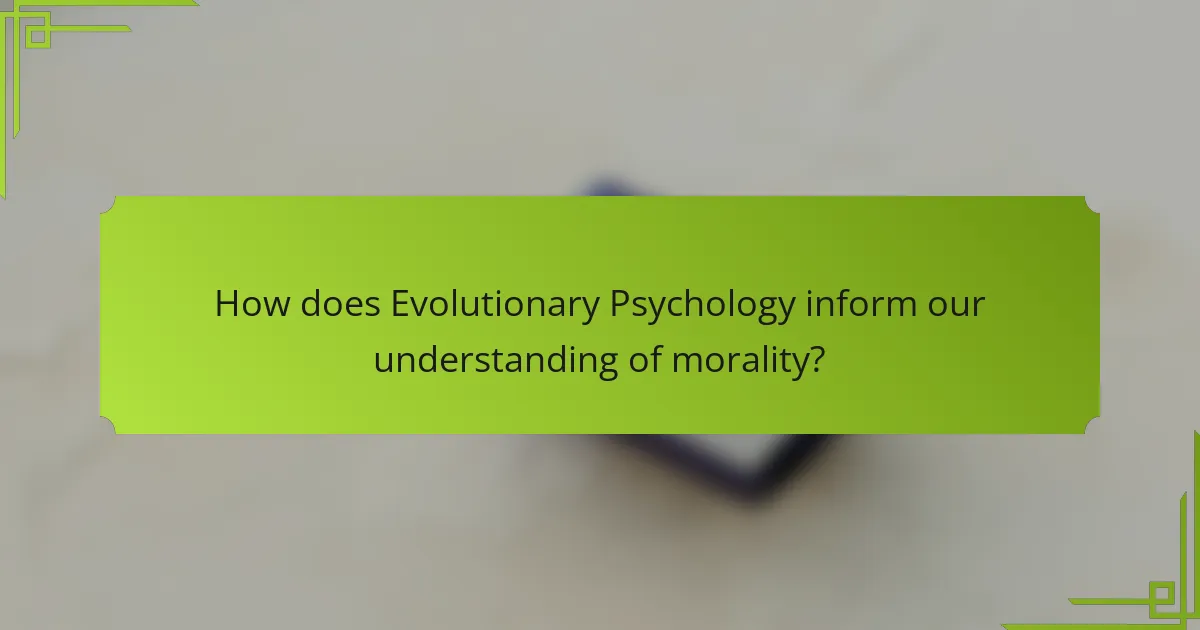
How does Evolutionary Psychology inform our understanding of morality?
Evolutionary psychology suggests that morality is a product of social evolution, enhancing group cohesion. It informs our understanding of morality by illustrating how moral behaviours evolved to promote cooperation and reduce conflict within human societies. Research indicates that shared moral values foster trust and collaboration, essential for survival. This perspective challenges the necessity of organized religion as a moral compass, positing that intrinsic moral instincts developed through evolutionary pressures are sufficient for ethical behaviour in social contexts.
What are the evolutionary roots of moral behaviour?
Moral behaviour has evolutionary roots in social cohesion and survival. Early humans developed cooperative behaviours to enhance group survival, fostering empathy and altruism. These traits promoted bonding and trust, essential for community living. Research indicates that moral systems evolved as adaptive mechanisms, ensuring group stability and resource sharing. This evolutionary perspective suggests that organized religion may not be necessary for moral behaviour, as social structures alone can cultivate ethical conduct.
How do empathy and altruism develop in human interactions?
Empathy and altruism develop through social interactions and evolutionary processes. Human connections foster emotional understanding, leading to altruistic behaviours that enhance group survival. Research indicates that shared experiences and cooperative tasks strengthen these traits, promoting social cohesion. Empathy serves as a unique attribute that drives individuals to act for others’ benefit, reinforcing moral frameworks within communities.
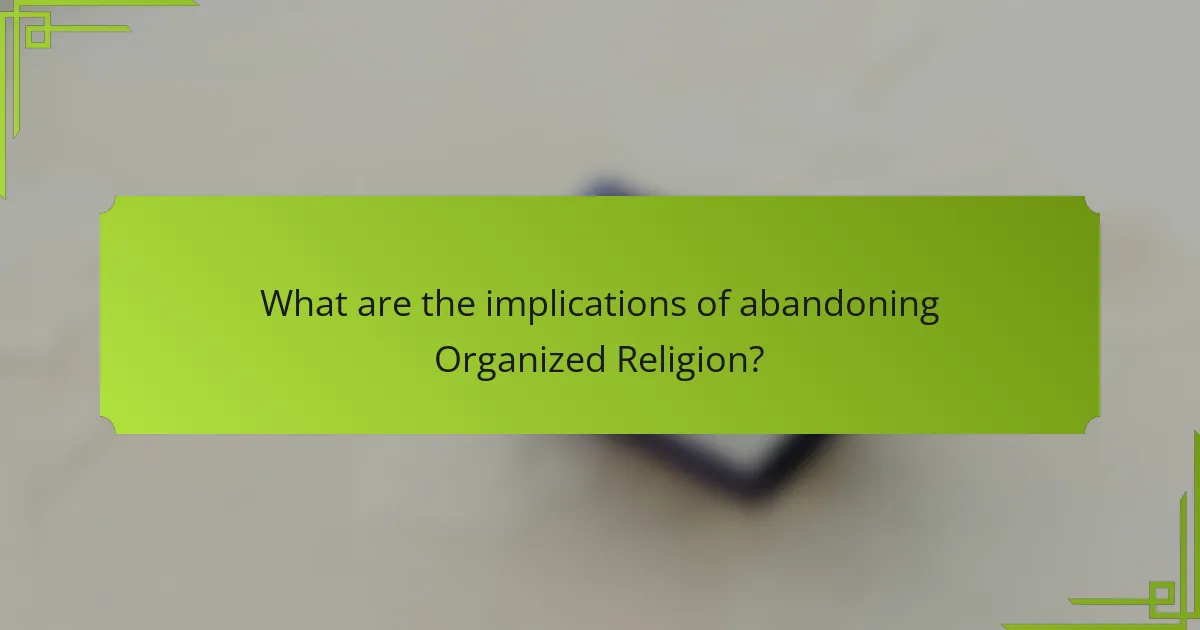
What are the implications of abandoning Organized Religion?
Abandoning organized religion can lead to significant shifts in societal structures and individual beliefs. Evolutionary psychology suggests that morality and social cohesion can thrive without religious frameworks. Research indicates that secular societies often experience high levels of trust and cooperation, reflecting a unique attribute of human morality that transcends religious boundaries. As a result, communities may develop alternative forms of social bonding and ethical guidelines, fostering inclusivity and diversity. The implications extend to personal identity, as individuals may seek meaning and purpose through secular philosophies, enhancing personal autonomy and critical thinking.
What best practices can individuals adopt for moral living?
Individuals can adopt several best practices for moral living without organized religion. These practices include fostering empathy, promoting social cohesion, and engaging in community service. Empathy enhances understanding and compassion, which are vital for moral behaviour. Social cohesion strengthens relationships and encourages collective responsibility. Community service provides opportunities for individuals to contribute positively to society, reinforcing moral values through action. By focusing on these aspects, individuals can cultivate a strong moral framework rooted in human psychology and social interactions.
How can communities foster social cohesion without religious frameworks?
Communities can foster social cohesion through shared values, mutual support, and inclusive activities. Emphasizing common goals promotes trust and collaboration. For example, community service projects unite individuals from diverse backgrounds, enhancing relationships. Research shows that social ties contribute to well-being and resilience. Engaging in local initiatives strengthens bonds and reinforces a sense of belonging.
What common mistakes should be avoided in secular moral discourse?
Avoiding common mistakes in secular moral discourse is essential for constructive dialogue. These mistakes include failing to recognize diverse moral perspectives, relying on emotional appeals instead of rational arguments, and neglecting the importance of evidence-based reasoning. Additionally, oversimplifying complex moral issues can lead to misunderstandings. Engaging with differing viewpoints fosters social cohesion and enhances moral discussions. Emphasizing critical thinking and empathy can bridge gaps in understanding, promoting a more inclusive moral discourse.
What expert insights can guide the transition to secular morality?
Expert insights suggest that secular morality can thrive through understanding human evolution and social dynamics. Emphasizing empathy and cooperation, evolutionary psychology reveals that moral behaviour can emerge naturally. Social cohesion, fostered through shared values and community engagement, strengthens moral frameworks without reliance on organized religion. Studies indicate that secular societies often exhibit high levels of altruism and ethical behaviour, showcasing the potential for a robust moral landscape independent of religious influence.
